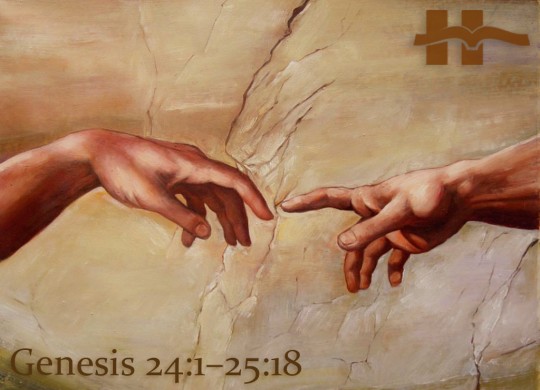Genesis 24:1−25:18

Mature faith trusts God to accomplish his purposes through his inscrutable design and through human action.
This pericope forms a sort of epilogue to the whole Abraham narrative. The patriarch’s exhortations to his servant regarding his desire for his seed, his son, to marry from among his own, form the last recorded words of Abraham (24:1–9). He twice mentions “Yahweh, the God of heavens” (24:3, 7). In these later days of his life, he is still confident in Yahweh’s promises, resolute in will never to return to the land he came from, or to let his son, Isaac, do so (24:7).
So the servant departs to search for the bride and, arriving at his destination, he prays. Then, it is expressly noted—with a “behold!”—that before the servant completed his prayer, Rebekah comes along (24:15). Human volition meets divine purpose; or perhaps one should say, divine purpose is prevenient to human volition. Indeed, in 24:45, the servant recounts this event as having occurred “before I had finished speaking in my heart.” God was working even before the servant had completed his unspoken prayer! Yahweh was answering the prayer even before the prayer was done.
Rebekah, it turns out, is a female Abraham, if you will. Abraham leaves “country” and “relatives” (12:1; 24:4) and “father’s house” (12:1; 24:38), and expects Rebekah to do so herself. Abraham’s “go” and “take” a wife for Isaac (24:4), is later reciprocated precisely by Rebekah’s folks responding to the servant with “take [Rebekah]” and “go” (24:51). In fact, she agrees to “go” herself (24:58), the servant “takes” her and “goes” (61), and finally, Isaac does so too, “taking” Rebekah (24:67). Indeed, both Abraham and Rebekah are foreshadowed as being blessed (12:2–3 and 24:1, 35) and becoming great (12:2 and 24:35). God is faithfully provident to those who have faith.
There is a clear expectation throughout this pericope that while one may “go,” only Yahweh can make that going successful (24:21, 40, 42, 56). Added to that is the servant’s affirmation, twice, that Yahweh “guides” (24:27, 48) providentially. It is ultimately Yahweh who determines the “success” of the entire venture (24:21, 40, 42). Testimony to Yahweh’s sovereign and providential working (his “lovingkindness,” 24:12, 14; in fact, “lovingkindness” marks the beginning and end of the servant’s prayer) is given by the narrator (24:15–16), the servant (24:26–27), and even by Rebekah’s folks, who express their agreement with the thesis that God was at work in the entire endeavor (24:50): “This matter comes from Yahweh.”
On the other hand one should not take this story as being only about divine guidance; the roles and actions of humans were not negligible in the story. Indeed, there is a hustle and bustle of human activity: besides the planning of Abraham and his servant, and all the “to-ing and fro-ing,” there is also the resourceful and diplomatic negotiations of the servant first with Rebekah, then with her family, and the equally shrewd and artful movements of Laban. All they did, or attempted to do, was working out the sovereign design of God. Here, divine working and human actions are shown to be interwoven, the warp and the woof, so to speak, of real life, over which God is supremely in control. The Almighty who chooses to work through his people and through his creation can be trusted to carry out his infallible purposes, even though it may involve fallible man. We can be assured that in, through, and with it all, divine purposes are accomplished.












 Abe Kuruvilla is the Carl E. Bates Professor of Christian Preaching at The Southern Baptist Theological Seminary (Louisville, KY), and a dermatologist in private practice. His passion is to explore, explain, and exemplify preaching.
Abe Kuruvilla is the Carl E. Bates Professor of Christian Preaching at The Southern Baptist Theological Seminary (Louisville, KY), and a dermatologist in private practice. His passion is to explore, explain, and exemplify preaching.